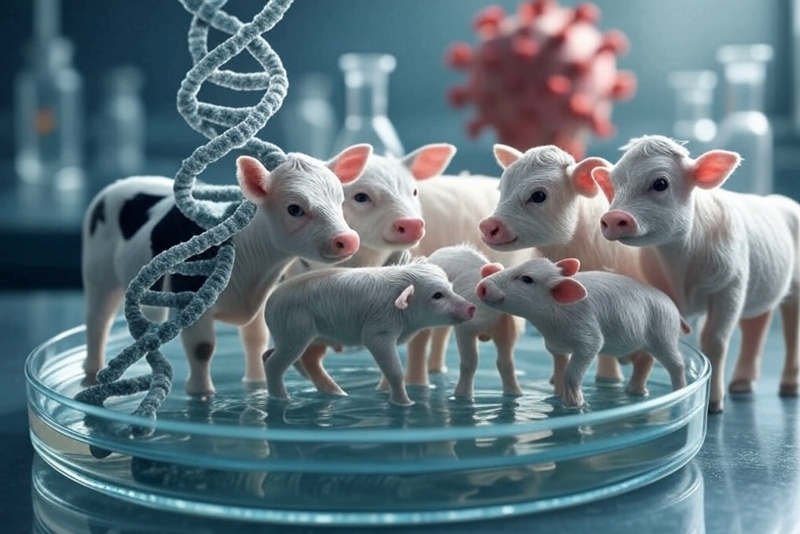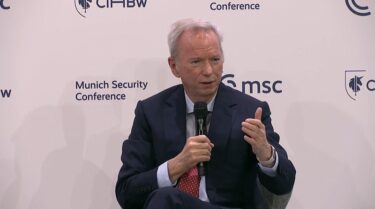Is genetically editing animals really about preventing pandemics, or is there something deeper to it? perspective
Former UK Prime Minister Tony Blair calls on the British government to enable gene editing and fund precision-bred livestock research to make animals “more resilient to viruses and prevent the spread of dangerous pathogens to humans.”
On May 9, the Tony Blair Institute for Global Change published a lengthy report co-written by Sir Anthony Blair himself called “A New National Purpose: Biosecurity as the Foundation for Growth and Global Leadership” that focused on several biosecurity risks, ranging from pandemics to DNA synthesis and biological warfare, along with policy proposals to tackle them.
In the report, Blair and company argue that the UK needs to bring forward legislation to allow for the gene editing of farm animals “as a matter of urgency” and to create a new precision-bred livestock resilience challenge fund to reduce the risks of “zoonotic-disease spillovers from livestock.”
“Gene-editing livestock can reduce zoonotic spillovers”
Tony Blair Institute, A New National Purpose: Biosecurity as the Foundation for Growth and Global Leadership, May 2025
According to the authors, “Most pandemics originate from zoonotic spillovers, where pathogens jump from animals to humans. These events account for 60 to 75 per cent of emerging infectious diseases, with most pandemics caused by viruses, though some stem from bacteria (as was the case with the Black Death).”
At the same time, they admit, “Lab leaks are common, with 309 lab-acquired infections and 16 known pathogen escapes documented between 2000 and 2021. High-risk pathogen labs continue to be built in countries with poor biosecurity standards.”
But let’s forget about that last part about lab leaks because it only relates to the last five years of our lives when governments and corporations used the fear of an alleged zoonotic spillover as an excuse to strip us of our rights while ushering-in a new era of technocracy.
Nah, instead, let’s focus on forever altering the genetic makeup of our livestock to save us from potential spillover pandemics and ignore the evidence of a lab leak that top health “experts” assured us didn’t exist a hot minute ago.
Nope, the best way forward, according to the geniuses at the Tony Blair Institute is “gene editing [that] can help breed farm animals that are more resilient to viruses and prevent the spread of dangerous pathogens to humans.“
Maybe so; maybe no.
Who knows? Genetically edited or precision-bred livestock may turn out to be a blessing.
How much do you trust Tony Blair giving policy recommendations for genetically editing your food supply?
“Recommendation: Bring forward secondary legislation to enable gene-editing in animals as a matter of urgency”
Tony Blair Institute, A New National Purpose: Biosecurity as the Foundation for Growth and Global Leadership, May 2025
“Recommendation: Create a new Precision-Bred Livestock Resilience Challenge Fund to fund research programs into reducing the risks of zoonotic spillovers from livestock, by reallocating funding away from the UKRI’s Biotechnology and Biological Sciences Research Council“
Tony Blair Institute, A New National Purpose: Biosecurity as the Foundation for Growth and Global Leadership, May 2025
According to the UK’s Food Standards Agency, “Precision breeding involves introducing genetic changes into the DNA of plants or animals limited to those that could occur through traditional breeding methods. These changes are introduced using modern biotechnology techniques such as gene editing.”
Precision breeding has already been implemented in the UK for plants, but it hasn’t been implemented for use in animals for human consumption.
This is why Blair is calling on the British government to “bring forward secondary legislation to enable gene-editing in animals.”
“The Genetic Technology (Precision Breeding) Act 2023 legalized gene-editing for precision breeding, but full implementation requires secondary legislation. So far, the government has only implemented this for plants, leaving uncertainty over gene-editing of animals. Experts have warned that this failure to proceed with implementation will damage the UK’s ability to reduce diseases in livestock, and risk losing gene-editing funding and talent to countries such as Brazil and the US where precision-bred livestock are legal”
Tony Blair Institute, A New National Purpose: Biosecurity as the Foundation for Growth and Global Leadership, May 2025
“Endemic livestock diseases cost UK farmers between £290 million and £710 million annually; losses that the widespread introduction of gene-edited, disease-resistant livestock could significantly reduce“
Tony Blair Institute, A New National Purpose: Biosecurity as the Foundation for Growth and Global Leadership, May 2025
Meanwhile, the United States just allowed a British biotech company, PIC (aka the Pig Improvement Company), to feed Americans with CRISPR-edited pigs.
As The Defender senior writer Brenda Baletti reported on May 9, “The US Food and Drug Administration (FDA) last week gave a UK-based biotech company the green light to produce gene-edited pigs for human consumption in the US.”
“The FDA’s approval allows the company to produce the pigs commercially, which includes allowing the pigs to reproduce and pass on their genetic modification,” she added.
“Advances in bioengineering and the use of gene drives to edit the genes of a species population, such as the genes that allow mosquitos to carry malaria, could result in accidental or deliberate damage by collapsing key species in an ecosystem”
Tony Blair Institute, A New National Purpose: Biosecurity as the Foundation for Growth and Global Leadership, May 2025
In his book, “The Fourth Industrial Revolution” published in 2017, World Economic Forum (WEF) founder Klaus Schwab wrote that animals could also be modified, so that their diet would be cheaper.
“The ability to edit biology can be applied to practically any cell type, enabling the creation of genetically modified plants or animals, as well as modifying the cells of adult organisms including humans […] In fact, the science is progressing so fast that the limitations are now less technical than they are legal, regulatory and ethical,” wrote Schwab.
“The list of potential applications is virtually endless—ranging from the ability to modify animals so that they can be raised on a diet that is more economical or better suited to local conditions, to creating food crops that are capable of withstanding extreme temperatures or drought,” he added.
If animals can be modified to be raised on a diet that is more economical, the same could be said about humans.
The technology already exists and ethical concerns keep it at bay for the most part, but given the right crisis, that all could change in an instant when a new global threat is identified, either real or perceived, and we’re told we’ll all have to band together to do what’s right for the good of society.
“Stronger livestock resilience not only reduces spillover risks but also cuts antibiotic use, helping combat antimicrobial resistance”
Tony Blair Institute, A New National Purpose: Biosecurity as the Foundation for Growth and Global Leadership, May 2025
If and when precision breeding and gene-editing livestock becomes the norm worldwide, will it stop with just trying to reduce spillover risks?
Or is this just the tip of the iceberg to produce designer animals that can be re-engineered for whatever purpose?
If the DNA of an entire species is to be re-written forever, what would be the long-term health effects on those who consume it?
Could this be a testbed for precision-breeding humans?
For many countries, designer babies are currently an ethical line not to be crossed.
However, MIT Technology Review reports that China has allegedly “been recruiting couples in an effort to create the first gene-edited babies.
“They planned to eliminate a gene called CCR5 in hopes of rendering the offspring resistant to HIV, smallpox, and cholera.”
If communist China were to be successful, would other nations follow suit?
Is genetically editing animals really about preventing pandemics, or is there something deeper to it?
Image Source: AI generated by Grok











